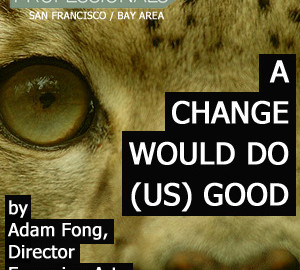A Change Would Do (Us) Good

Changing jobs can be painful, but it might just be a service to the field.
At Grants for the Arts’ 2011 Fall Public Meeting on Leadership Issues in the Arts, Marc Vogl hit on why staff changes, particularly in leadership, are so delicate.
“The reason it’s sensitive is that it’s personal. This isn’t just a job: this is a calling, this is a career, this is a passion, this is a lifetime, this is family.”
Often the potential fallout from changing jobs can be the most powerful deterrent, whether it’s you, your colleagues, or your constituents who will bear the burden of transition. If, like me, you work in a small organization, your departure will force everyone else to adapt, and your hard-working colleagues will need to expend extra energy to integrate a new team member.
You’re not alone if you fear that the added stress could put your organization at risk, as well as jeopardize your own career.
Growing Pains
Another panelist, Michael Warr, proposed that we in the nonprofit arts sector need a “cultural reformation.” Among the many positive actions he suggested were:
- Put people (especially leaders nearing retirement) who want to leave in a good position to do so.
- Stop demanding leadership candidates meet the complete (and “ridiculous”) list of requirements that is often given in job descriptions.
- Increase appreciation for transferable skills from other roles and sectors.
- Be willing to fail, to fail faster, and to learn from failures.
Among the greatest hurdles to these changes is the underlying assumption that the field as a whole cannot grow. When there is no job growth, or when there is a recession as in 2009, we all feel trapped. Employment becomes a zero-sum game; risks become taboo. And worse, those who are already out of work have few avenues in. In that worldview, organizational change and growth are nearly impossible.
Here’s a look at the annual turnover rates in the nonprofit sector as compared to rates across all industries, distinguishing between voluntary and total turnover (data from CompData Surveys’ BenchmarkPro Survey, collected from HR departments):
The nonprofit sector has, unsurprisingly, followed the larger trend since the 2008 crash: people who do have jobs are keeping them, and the percentage of voluntary departures has dipped steeply. It’s down from 12.5 percent in 2008 to 10.4 percent in 2009, and receding below 10 percent in both nonprofit and all industries by 2010.
In other words, if you work in an organization of ten employees, on average you had one person leave last year. And — if we pretend for a moment that these figures also apply to small organizations in the nonprofit arts sector — in an organization of five employees, only one staff member has changed in the last two years.
Last fall the “rate of change” and our collective ability to “adapt” were hot topics. But if we’ve only welcomed one new voice to our team in the last two years, how fast can we really be expected to adapt?
More food for thought: In 2011, the industries with the highest voluntary turnover were hospitality, healthcare, and banking and finance. Can you guess which industries had the most growth?
It’s good for you
While considering my own job change, I came across “Four Good Reasons to Change Jobs Within the Same Industry Three Times During Your First Ten Years of Employment” by National Executive Resources, Inc. They were:
1. Changing jobs give you a broader base of experience.
2. A more varied background creates a greater demand for your skills.
3. A job change results in an accelerated promotion cycle.
4. More responsibility leads to greater earning power.
Not counting my grad school hiatus and part-time gigs, I am leaving job number two after seven years in the nonprofit arts sector. So is this why I’m leaving? To get broader experience, to become marketable to more companies, to get a promotion, and rake in the cash with my new-found “earning power”?
In a word, no.
But what if we replace the market-speak with mission-based alternatives?
experience –> knowledge
skills –> capacity
promotion –> creativity
earning –> impact
Put this way, YES, it’s why I’m leaving. I do want more knowledge and capacity, and opportunities to creatively impact the sector (in my case specifically, contemporary music).
Transitions will always be tricky, even with open communication and a well-executed hand-off. But if, like me, you want to maximize your impact (née earning power) and help the arts sector grow, changing jobs might just be a service to the field.
Image: Not So Much





Great post, Adam! This is very refreshing to hear amidst the panic and dooming thoughts of "hold on to what you have because you'll never get anything else."
Leaving an organization helps the organizations itself as well. We recently had someone leave and it illuminated many processes which could be simplified or tweaked to provide more impact. The most recent event, which would normally have been organized by her, was organized by a team of us and it was our most successful.